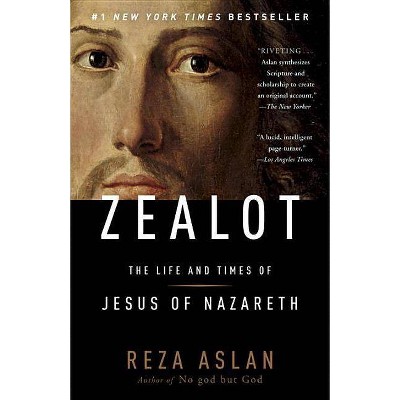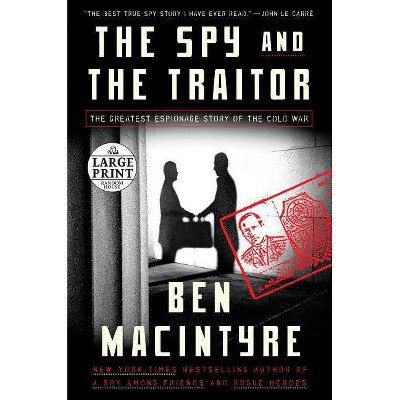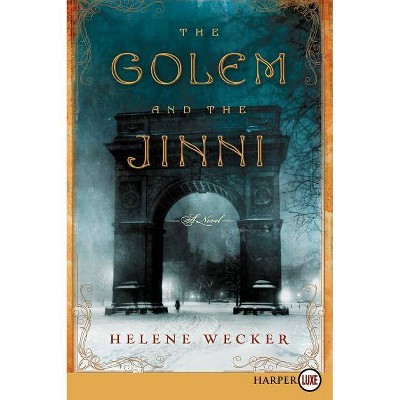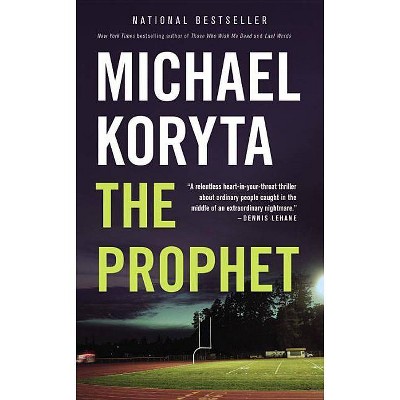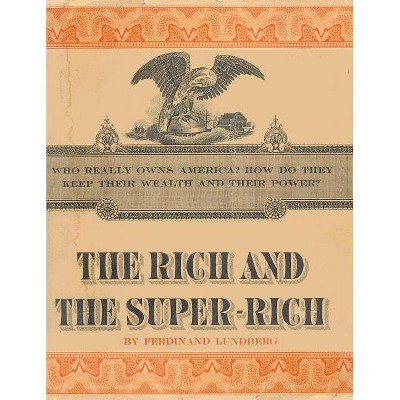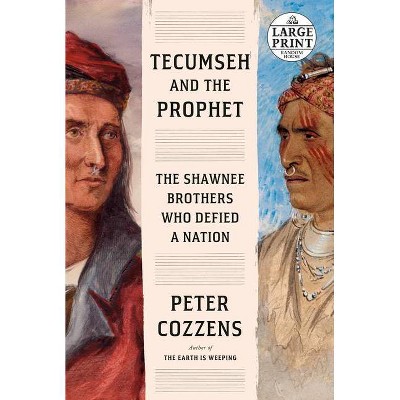The Zealot and the Emancipator - Large Print by H W Brands (Paperback)
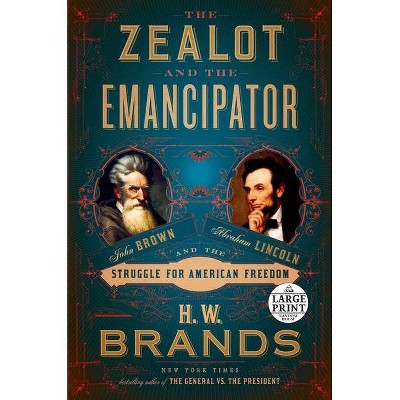
Similar Products
Products of same category from the store
AllProduct info
<p/><br></br><p><b> About the Book </b></p></br></br>"What do moral people do when democracy countenances evil? The question, implicit in the idea that people can govern themselves, came to a head in America at the middle of the nineteenth century, in the struggle over slavery. John Brown's answer was violence--violence of a sort some in later generations would call terrorism. Brown was a deeply religious man who heard the God of the Old Testament speaking to him, telling him to do whatever was necessary to destroy slavery. When Congress opened Kansas territory to slavery, the eerily charismatic Brown raised a band of followers to wage war against the evil institution. One dark night his men tore several proslavery settlers from their homes and hacked them to death with broadswords, as a bloody warning to others. Three years later Brown and his men assaulted the federal arsenal at Harpers Ferry, Virginia, with the goal of furnishing slaves with weapons to murder their masters in a race war that would cleanse the nation of slavery once and for all. Abraham Lincoln's answer was politics. Lincoln was an ambitious lawyer and former office-holder who read the Bible not for moral guidance but as a writer's primer. He disliked slavery yet didn't consider it worth shedding blood over. He distanced himself from John Brown and joined the moderate wing of the new, antislavery Republican party. He spoke cautiously and dreamed big, plotting his path to Washington and perhaps the White House. Yet Lincoln's caution couldn't preserve him from the vortex of violence Brown set in motion. Arrested and sentenced to death, Brown comported himself with such conviction and dignity on the way to the gallows that he was canonized in the North as a martyr to liberty. Southerners responded in anger and horror that a terrorist was made into a saint. Lincoln shrewdly threaded the needle of the fracturing country and won election as president, still preaching moderation. But the time for moderation had passed. Slaveholders lumped Lincoln with Brown as an enemy of the Southern way of life; seven Southern states left the Union. Lincoln resisted secession, and the Civil War followed. At first a war for the Union, it became the war against slavery Brown had attempted to start. Before it was over, slavery had been destroyed, but so had Lincoln's faith that democracy can resolve its moral crises peacefully"--<p/><br></br><p><b> Book Synopsis </b></p></br></br><b><b>From the acclaimed historian and bestselling author: a</b> page-turning account of t<b>he epic struggle over slavery as embodied by John Brown and Abraham Lincoln--two men moved to radically different acts to confront our nation's gravest sin.</b><br></b><br> John Brown was a charismatic and deeply religious man who heard the God of the Old Testament speaking to him, telling him to destroy slavery by any means. When Congress opened Kansas territory to slavery in 1854, Brown raised a band of followers to wage war. His men tore pro-slavery settlers from their homes and hacked them to death with broadswords. Three years later, Brown and his men assaulted the federal arsenal at Harpers Ferry, Virginia, hoping to arm slaves with weapons for a race war that would cleanse the nation of slavery. <p/>Brown's violence pointed ambitious Illinois lawyer and former officeholder Abraham Lincoln toward a different solution to slavery: politics. Lincoln spoke cautiously and dreamed big, plotting his path back to Washington and perhaps to the White House. Yet his caution could not protect him from the vortex of violence Brown had set in motion. After Brown's arrest, his righteous dignity on the way to the gallows led many in the North to see him as a martyr to liberty. Southerners responded with anger and horror to a terrorist being made into a saint. Lincoln shrewdly threaded the needle between the opposing voices of the fractured nation and won election as president. But the time for moderation had passed, and Lincoln's fervent belief that democracy could resolve its moral crises peacefully faced its ultimate test.<br> <i> <br>The Zealot and the Emancipator </i>is the thrilling account of how two American giants shaped the war for freedom.<p/><br></br><p><b> Review Quotes </b></p></br></br><br><b>One of <i>Smithsonian Magazine</i>'s Best Books of 2020<br></b><br>"[Brands] scrupulously narrates the relevant facts and trusts readers to form their own conclusions. . . <i>The Zealot and the Emancipator</i> relates these familiar events skillfully. . . [Brands] recognize[s] that the contrast between Brown and Lincoln offers a lesson that has never been timelier. Prudence and idealism are complementary virtues. And zeal unencumbered by a concern for consequences is indistinguishable, in practice, from bloodlust."<br><b>--<i>The Wall Street Journal</i></b> <p/>"Brands's study of Brown and Lincoln [is] at heart an appraisal of contrasting political designs and personas in prerevolutionary times. . . [<i>The Zealot and the Emancipator</i>] builds on strengths long evident in Brands's books, combining expert storytelling with thoughtful interpretation vividly to render major events through the lives of the chief participants. . . This book presents a gripping account of the politics that led to Southern secession, war and the abolition of slavery."<br><b>--<i>The New York Times Book Review</i></b> <p/>"Gripping. . . [Brands poses] a worthy question for any era but particularly for the one we're living through. . . Brands offers a nuanced middle path. In Brown and Lincoln, he presents two perfectly imperfect heroes who act in ways that both excite and disappoint us. . . <i>The Zealot and the Emancipator</i> feels particularly well timed. . . The lessons it contains about America's slow progress toward a more perfect union, even during a time of literal disunionification, are legion, but the takeaway is clear."<br><b><i>--The Washington Post</i></b> <p/>"[<i>The Zealot and the Emancipator</i> is] a tale told by a master storyteller, with a momentum and a power appropriate to the subject. In these pages we have the hare (Brown) and the tortoise (Lincoln). In these pages it is no fable, but instead one of the greatest, but surely the bloodiest, American stories."<br><b><i>--The Boston Globe</i></b> <p/>"<i>The Zealot and the Emancipator</i> deftly recounts two martyrs' disparate approaches to ending slavery. . . Engaging. . . Brands concludes his fast-paced book with a grand flourish, bringing the seemingly disparate legacies of Brown and Lincoln into sync."<br><b>--<i>Washington Independent Review of Books</i></b> <p/>"Fascinating. . . This book is the work of a master historian at the top of his craft."<br><b>--<i>New York Journal of Books</i></b> <p/>"A skilled narrative writer, Brands offers a vivid account of the raid on Harper's Ferry and its aftermath."<br><b><i>--London Review of Books</i></b> <p/>"Featuring the riveting narrative sweep, sharp eye for detail, and original analysis we have come to expect from H. W. Brands, <i>The Zealot and the Emancipator </i>vividly illuminates the convulsive battles to fulfill the long-deferred American dream of freedom for all. Along the way, Brands makes thought-provoking connections between these two extraordinary men--a revolutionary and a president--that have eluded most historians for generations. Here is a book that deserves to become foundational reading for America's new reckoning with slavery, race, and racism."<br> <b>--Harold Holzer, author of <i>The Presidents vs. the Press</i> and winner of the Gilder Lehrman Lincoln Prize</b> <p/> "Frederick Douglass appreciated both Abraham Lincoln, whom he deemed 'emphatically the black man's president, ' and John Brown, whose zeal in the cause of black freedom he acknowledged 'was far greater than mine.' Similarly, H. W. Brands evenhandedly portrays both of those martyrs to African American freedom as they trod their separate and distinct paths toward the same goal. This volume is a worthy companion to Brands's earlier biographies of FDR, Benjamin Franklin, and other eminent Americans."<br> <b>--Michael Burlingame, author of <i>Abraham Lincoln: A Life</i></b> <p/>Fascinating<br><b>--<i>The New York Times</i></b> <p/>"Excellent. . . Brands is an adroit storyteller and captures both Brown's intensity and zeal and Lincoln's pragmatism and wit."<br><i><b>--Christian Science Monitor</b></i> <p/>"Reveal[s] striking parallels between the elections of 1860 and 2020. The extreme polarization, violent rhetoric, distortions - we've been here before."<br><b><i>--Austin Chronicle</i></b> <p/> "Brands is a master storyteller. . . Brands uses original sources and narrative flair to illuminate how Brown's fierce moral clarity eventually forced Lincoln to confront the sins of slavery. The result is an informative, absorbing and heartbreaking American story, the reverberations of which are still felt today."<br><b><i>--Booklist</i> (starred)</b> <p/>"Entertaining and insightful . . . Brands provides essential historical context and intriguing insights into both men's characters and decision-making. American history fans will be thrilled."<br> <b><i>--Publishers Weekly</i></b> <p/> "An outstanding dual biography"<br> <b><i>--Kirkus Reviews</i> (starred)</b> <p/>"Brands skillfully lays out nuances in [Lincoln and Brown's] lives."<br><b><i>--Booklist</i> (starred)</b> <p/>"A fascinating and wonderfully readable portrayal of the tensions between fiery militancy and determined but measured devotion in working toward a goal. Excellent for general readers, especially those with an interest in the Civil War."<br><b>--<i>Library Journal</i></b><i><br></i><br>"Superb. . . A fascinating, authoritative, carefully researched account. . . Complex, stunning, and thought-provoking. . . Brands presents the portraits of these two giants, Brown and Lincoln, in such stark and affecting terms that we cannot help but be moved and jarred by this story of their lives, their times, their beliefs and their deaths. We all might profit from careful consideration of those lives and the laws and conditions that defined them and shaped their identities and destinations."<br><b>--BookReporter.com</b> <p/>"Brisk and vivid . . . engaging."<br><b>--Shelf Awareness</b> <p/>"Good books about history inform. Great books about history inform, enlighten, and entertain. [<i>The Zealot and the Emancipator</i>] does all three. [Brands] creates this magic by using nuance, pacing, erudition, and the magic of a born storyteller, [drawing] the reader not only into the multilayered personalities of the book's leading men [but] also into the fragmented, harshly divisive, and sometimes violent state of American society in the years leading up to the Civil War. . . Impressive research and tightly woven narrative."<br><b><i>--Blue Mountain Review</i></b> <p/>"Incredibly timely. . . Given the present political climate, one cannot help but find parallels, lessons, and warnings in <i>The Zealot and the Emancipator</i>."<br><b>--<i>Law & Liberty</i></b> <p/>"Brands has written perhaps his most fluent book, a constantly engaging study of history and biography worthy of the model on which it is built: Plutarch's parallel lives. . . Sometimes Brands needs only a sentence to show why Brown and Lincoln belong together. . . That kind of parallel structure reminds me of Samuel Johnson."<br><b>--The University Bookman</b> <p/>"Your concept of the antebellum and Civil War eras will be reshaped by this masterpiece."<br><b>--</b><i>The Archive</i><b>, Best Books of 2020</b> <p/>"Brands is an outstanding storyteller. . . theatrical in his oral presentations of historical events. His prose is just as exciting. He is able to tell stories of complex issues without being tedious or pedantic. . . Brands could write about planting grass and make it entertaining."<br><b>--<i>Roanoke Times</i></b><br><p/><br></br><p><b> About the Author </b></p></br></br>H. W. BRANDS holds the Jack S. Blanton Sr. Chair in History at the University of Texas at Austin. He has written more than a dozen biographies and histories, two of which, <i>The First American</i> and <i>Traitor to His Class, </i> were finalists for the Pulitzer Prize.
Price History
Price Archive shows prices from various stores, lets you see history and find the cheapest. There is no actual sale on the website. For all support, inquiry and suggestion messagescommunication@pricearchive.us
